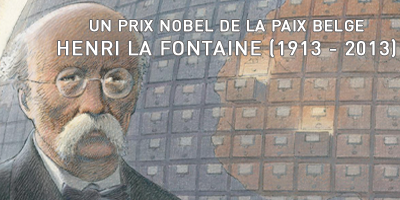A Belgian Peace Nobel Prize: Henri La Fontaine (1913 - 2013)

A Belgian Peace Nobel Prize (1913 - 2013)
Belgian iconic personality of the late 19th century and early 20th century, Henri La Fontaine (1854-1943), a major figure of pacifism, campaigns for the development of international law. He anticipates the proposed League of Nations (forerunner of the United Nations), which it will be associated during its creation after World War II. In 1913, the multiple actions it carries out national and international level including as president of the International Peace Bureau, are awarded the Nobel Peace Prize. Politician, Henri La Fontaine agrees to socialism since the creation of the Belgian Labour Party in 1885 and entered the Senate, where he held the position of Vice-President. In this meeting, it is involved in discussions on universal suffrage, international issues, or teaching. Strong advocate for women's issues, it is sensitive to the status of women and work in several movements that promote emancipation. Free thinker and a Freemason, it contributes to the introduction of diversity in Belgian Freemasonry. Passionate bibliographer, he founded with Paul Otlet the Mundaneum where all knowledge of the world were collected in order that peace would born of this shared knowledge. Henri La Fontaine has published numerous articles and books on legal, political, literary or musical. These writings reveal the different facets of this humanist and polymath. Do you want to welcome a member of the Mundaneum team for a mini-conference and animations?
Contact us via +32 (0)65/39.54.80 or priscilla.genicot@mundaneum.be!
Personnalité belge emblématique de la fin du 19ème siècle et du début du 20ème siècle, Henri La Fontaine (1854-1943), figure incontournable du pacifisme, milite pour le développement du droit international. Il anticipe le projet de Société des Nations (préfigurant l’Organisation des Nations Unies), auquel il sera associé lors de sa création après la première guerre mondiale. En 1913, les multiples actions qu’il mène sur le plan national et international notamment en tant que président du Bureau international de la paix, sont récompensées par le prix Nobel de la paix.
Homme politique, Henri La Fontaine se rallie au socialisme dès la création du Parti ouvrier belge en 1885 et accède au Sénat, où il occupera la fonction de vice-président. Dans cette assemblée, il intervient dans les débats relatifs au suffrage universel, aux questions internationales, ou encore à l’enseignement. Ardent défenseur de la cause féminine, il est sensible à la condition de la femme et œuvre dans plusieurs mouvements défendant son émancipation. Libre penseur et franc-maçon, il contribue à l’introduction de la mixité dans la franc-maçonnerie belge. Bibliographe passionné, il fonde le Mundaneum avec Paul Otlet, où tous les savoirs du monde devaient être réunis afin que la paix naisse du partage de la connaissance. Henri La Fontaine a publié de nombreux articles et ouvrages sur des questions juridiques, politiques, littéraires ou encore musicales. Ces écrits révèlent les différentes facettes de cet esprit humaniste et encyclopédique.
Vous souhaitez accueillir un membre de l'équipe du Mundaneum pour une mini-conférence et animation?
Contactez-nous au 065/39.54.83 ou info@mundaneum.be!





